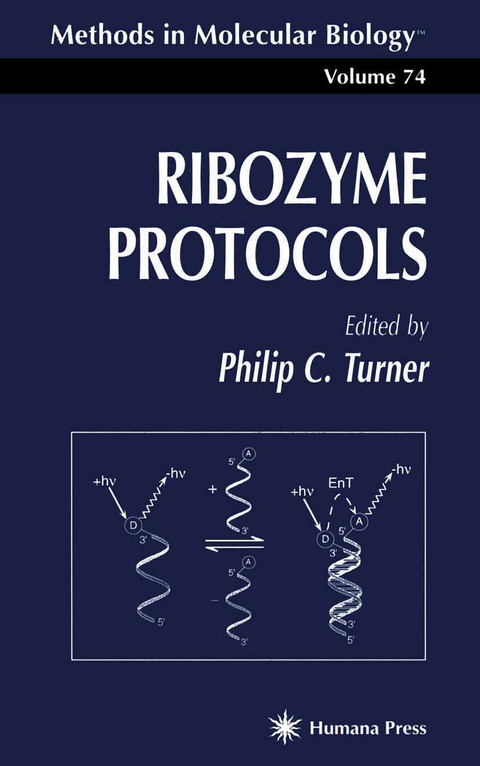
Ribozyme Protocols
Humana Press Inc. (Verlag)
978-1-4899-4285-2 (ISBN)
Ribozymes.- Computer-Aided Calculation of the Local Folding Potential of Target RNA and Its Use for Ribozyme Design.- Computational Approaches to the Identification of Ribozyme Target Sites.- Computer Analysis of the Conservation and Uniqueness of Ribozyme-Targeted HIV Sequences.- Selection of Accessible Sites for Ribozymes on Large RNA Transcripts.- Selection of Efficient Ribozyme Cleavage Sites in Target RNAs.- Chemical Synthesis, Analysis, and Purification of Ribozymes.- A Practical Method for the Production of RNA and Ribozymes.- Preparation of Templates for Production of Ribozymes and Substrates.- Enzymatic Synthesis and Characterization of Unmodified Ribozymes and Substrates.- T7 Transcript Length Determination Using Enzymatic RNA Sequencing.- Chemical and Enzymatic Approaches to Construct Modified RNAs.- Applications of Modified Transcripts.- Cloning Strategies for Catalytic Antisense RNAs.- PCR-Based Construction of Long Hammerhead Ribozymes.- Design and Production of Asymmetric Hammerhead Ribozymes.- Minimized Hammerhead Ribozymes.- Design of Hairpin Ribozymes for In Vitro and Cellular Applications.- Design of the Hairpin Ribozyme for Targeting Specific RNA Sequences.- Design and Preparation of Sequence-Specific RNase P Ribozymes.- Theoretical Considerations in Measuring Reaction Parameters.- Experimental Approaches for Measuring Reaction Parameters.- Determination of Catalytic Parameters for Hairpin Ribozymes.- Characterizing Ribozyme Cleavage Reactions.- Defining Optimum Reaction Conditions for Hammerhead Ribozymes.- Using Fluorescence Resonance Energy Transfer to Investigate Hammerhead Ribozyme Kinetics.- Design of Hybridizing Arms in Hammerhead Ribozymes.- Optimization of Hammerhead Flanking Sequences Using Oligonucleotide Facilitators.- Enhancement of Ribozyme Function by RNA Binding Proteins.- Selection of Fast-Hybridizing Complementary RNA Species In Vitro.- In Vitro Selection of Hairpin Ribozymes.- The Detection of Hammerhead Ribozyme Cleavage by RT-PCR Methods.- Detection of Ribozyme Cleavage Products Using Reverse Ligation-Mediated PCR (RL-PCR).- Quantitation of Ribozyme Target Abundance by QCPCR.- Trans-Splicing Reactions by Ribozymes.- Ligation of RNA Molecules by the Hairpin Ribozyme.- Mutagenesis and Modeling of the Hairpin Ribozyme Family.- Preparation of Homogeneous Ribozyme RNA for Crystallization.- Establishing Suitability of RNA Preparations for Crystallization.- A Sparse Matrix Approach to Crystallizing Ribozymes and RNA Motifs.- Crystallographic Analyses of Chemically Synthesized Modified Hammerhead RNA Sequences as a General Approach Toward Understanding Ribozyme Structure and Function.- tRNA Delivery Systems for Ribozymes.- Expressing Ribozymes in Plants.- Using Microinjection of Xenopus Oocytes to Express and Optimize Ribozymes In Vivo.- Exogenous Cellular Delivery of Ribozymes and Ribozyme Encoding DNAs.- Optimization of Lipid-Mediated Ribozyme Delivery to Cells in Culture.- Retroviral Delivery and Anti-HIV Testing of Hammerhead Ribozymes.- Hairpin Ribozyme Gene Therapy for AIDS.- Clinical Aspects of Ribozymes as Therapeutics in Gene Therapy.
| Reihe/Serie | Methods in Molecular Biology ; 74 |
|---|---|
| Zusatzinfo | 54 Illustrations, black and white; XIV, 492 p. 54 illus. |
| Verlagsort | Totowa, NJ |
| Sprache | englisch |
| Maße | 152 x 229 mm |
| Themenwelt | Naturwissenschaften ► Biologie ► Biochemie |
| ISBN-10 | 1-4899-4285-8 / 1489942858 |
| ISBN-13 | 978-1-4899-4285-2 / 9781489942852 |
| Zustand | Neuware |
| Informationen gemäß Produktsicherheitsverordnung (GPSR) | |
| Haben Sie eine Frage zum Produkt? |
aus dem Bereich


